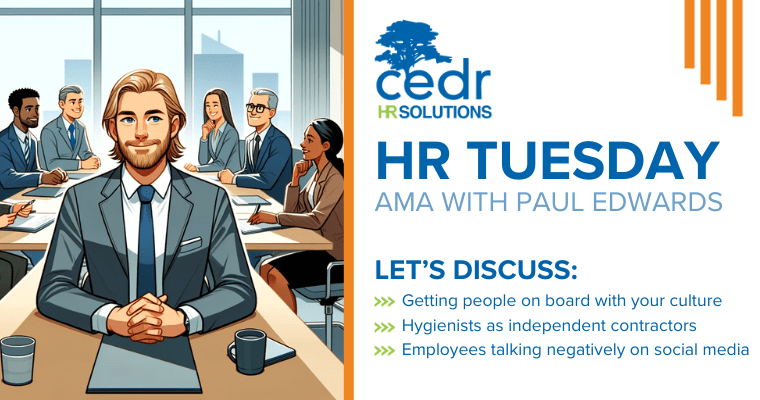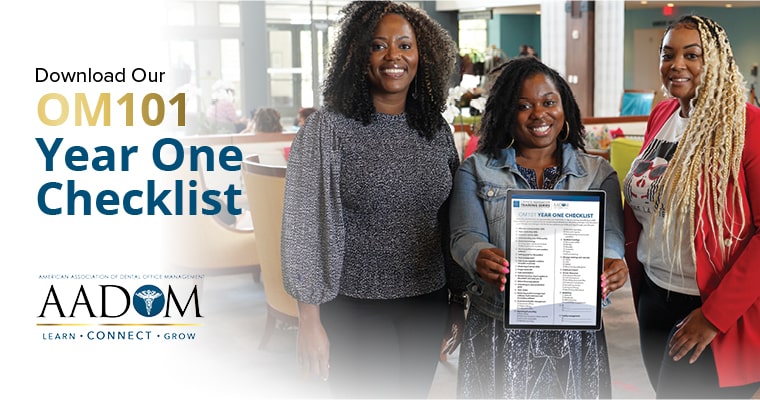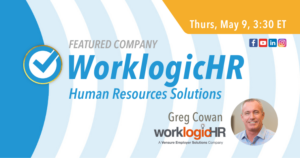Cannabis Usage, Pumping on the Clock, and Using Phones While Working – HR Tuesday AMA with CEDR (March 2024)
Hello AADOM Tribe! Welcome back to the monthly LIVE Ask Me Anything with Paul Edwards, CEDR CEO & Founder, and Heather Colicchio, founder and president of AADOM. Anytime you feel like a little extra perspective, or help might be nice throughout the year, keep sending your toughest HR questions to Paul and CEDR’s team of HR professionals. Our team will pick from the submitted dozens and do our absolute best to give some effective and creative ideas for solving your issue. To submit your questions, click here…Click to open link in a new tab…!
Thanks for all the questions you’ve been submitting and those coming in 2024! Once a month, Paul and CEDR’s team of experts weigh in and answer three of your HR questions for HR Tuesday’s article and live webcast.
For the in-depth, expanded, and detailed answers… Listen to HR Tuesdays live, mark your calendar for the second Tuesday of each month, or go here to check out the archived recordings.
All of your daily human resource issues likely have some state, federal, or local employment laws that you must comply with while, at the same time, trying to find the best human way to solve the core problem. We will fit the two together during our answers and help you devise some great resolutions.
HR Tuesday needs your questions, so please send us your toughest ones! Our team will pick from the dozens of great questions you all submit and do our absolute best to give some effective and creative ideas for solving your issue. To submit your questions, click here!
Let’s get started…
Cannabis Usage, Pumping on the Clock, and Using Phones While Working – You Asked, We Answered
Hello once again, AADOM tribe! March seems extra busy for all of you, as we have more than 50 HR questions that have been submitted for HR Tuesday thus far! Keep them coming as we answer here and cover a few over on the What the Hell Just Happened?! Podcast. Remember, any time you have an HR issue that either stumps you or want a different perspective on how to solve it, submit it here for Paul and his team of experts to help you each month during HR Tuesday.
If you’re new here, once a month, Paul and CEDR’s team of experts weigh in and answer three of the HR questions from your community on AADOM’s HR Tuesday article and live webcast. Be sure to tune in live or check the rebroadcast if you can’t make it. Paul and his team go into much more detail (with AADOM superstar Heather Colicchio), and answer questions submitted by the audience in the moment!
Always remember that your daily human resource interactions likely have some state, federal, or local employment laws that you must consider when trying to find the best human way to solve the core problem. We will fit the two together during our answers and help you devise some great resolutions.
Let’s turn it over to the HR Experts and get to those answers… Here are some of your best submissions this month:
- “How are offices handling the recent changes to laws regarding the use of medical cannabis – as far as updating their handbooks and office policies?”
- “I am so frustrated with cell phone usage while people working!!! How can we control without losing all of our staff? We have a policy, but they all have excuses for not following it! And if it’s not a cell phone, it’s a smartwatch. Please tell me what to do here!”
- “Can I set a schedule with an employee who is pumping while on the clock? We have an employee who has been pumping two times a day while she is on the clock, but other employees are complaining that they think she is abusing her time and deciding to pump while the clinic is at its peak.”
Let’s Get to the Answers
Question: How are offices handling the recent changes to laws regarding the use of medical cannabis – as far as updating their handbooks and office policies?
The Legal Perspective: All states with legal recreational cannabis make it clear that you can prohibit employees from being under the influence at work. Some clarify that you can’t discriminate for lawful, off-duty conduct.
If you have a professionally customized Employee Handbook, such as one written by CEDR, you should already have the policy that states employees cannot work while impaired. The legalization of cannabis doesn’t change this policy – alcohol is also legal, but that doesn’t mean your employees can be drunk at work. No one gets to work impaired.
Speaking of policy, a professional may need to make a change or add to your employee policies based on the law in your state. Like many policies, continuing education on the subject is as important as the policy itself. Understanding the protections the law in your state provides for medical and recreational use is essential because it governs how and what you say or do should an issue arise.
For instance, many states make it a little trickier for employers because of the new anti-discrimination language contained within the cannabis legalization laws. There could be increased protections for medical users. The same protections could be there for legal, off-duty recreational use. A few states dictate what you can and can’t do or consider if a positive test arises during a screening for employment, as well as ongoing drug testing during employment.
These protections typically say that an employer cannot take any adverse action against an employee or applicant because they are a registered medical cannabis cardholder or they use cannabis products. In other words, simply knowing that an employee uses cannabis products cannot be the basis for disciplinary action or any employment decision.
Even testing is being called into question, some states go a step further to say that employers cannot take any adverse action against an applicant or employee solely due to the presence of cannabis on a drug test. In effect, this means that in addition to a positive drug test, you would need to show that the employee was in possession of cannabis at the workplace or impaired on the job to take action.
Your HR Support team should proactively provide additional education and training and be available to take your call and walk you through any scenario you face.
Some of the reasoning behind these types of protection is to bring them in line with other substance testing. Whether it’s pain medicine or cannabis, there is no reliable medical test that indicates whether a person is under the influence at a particular moment. While blood-alcohol and controlled substance testing can determine whether alcohol is present in the employee’s system when the test takes place, current cannabis testing can only determine that a person has used the drug in the last couple of weeks and not much more. So, many states are discouraging relying solely on a positive drug test for disciplinary action, you could be punishing an employee for legal off-duty conduct.
Now for the Human Approach: If you have reasonable suspicion that someone appears to be under the influence of cannabis or any substance, they can and should be relieved of duties pending your investigation. Suspending them should be based on objective signs of use, which can include smell but may also include different behavior, bloodshot eyes, slurred speech, altered physical gait or posture, etc.
If someone simply smells like cannabis, a ‘seek to understand’ conversation would be a better place to start rather than jumping to a suspension. It is possible that an employee’s clothing or hair smells like cannabis for reasons other than use.
You can still send them home to change because smelling like cannabis can still be against your policies that address not smelling weird at work, and you can still address the smell in a disciplinary way.
While you can’t necessarily take action against someone simply because you know they use marijuana outside of work hours, you can ensure that this off-the-clock activity doesn’t impact your office.
Whether it’s due to a prescribed or recreational substance, do not allow impairment at work to go unaddressed. Impairment is definitely a situation that warrants disciplinary action, possibly even termination. That’s why your notes and documentation are crucial. If you suspect impairment, you need to document what you are seeing. Stick to the facts, and stay away from judgments or conclusions. Focus on what you can see, hear, and smell and detail the impact on your practice and their ability to do their job.
Remember, HR TUESDAY DEPENDS ON THE AADOM TRIBE, ASKING GREAT HR-RELATED QUESTIONS! Submit your HR questions for Paul to discuss on the next HR Tuesday LiveCast here!
Question: “I am so frustrated with cell phone usage while people are working!!! How can we control this without losing all of our staff? We have a policy, but they all have excuses for not following it! And if it’s not a cell phone, it’s a smartwatch. Please tell me what to do here!”
The Legal Perspective: Your employee handbook should definitely address the use of cell phones directly (all CEDR employee handbooks contain customized, legally compliant cell phone and social media policies). However, writing a legally compliant cell phone policy takes more knowledge and education than most people understand. This is one of these policies and problems that can cause tangential issues, including breaking the law.
Cell phone policies are a prime example of where most people who write them on their own get it wrong. Mostly, what needs to be understood is that smartphones are considered to be communication devices, and employers need to be careful when tamping down or attempting to regulate anything that might limit their employees from communicating. Your employees’ rights to communicate with one another about work-related things, including all sorts of tangential things concerning working conditions, is protected by law.
The law that we are talking about contains a set of regulations that apply to everyone reading and is called the Nation Labor Relations Act. (NLRA) It is enforced by a board with an active army of regional lawyers who work for the federal government.
The NLRB (the board) routinely challenges and strikes down over-broad policies that attempt to over-regulate employee communications, especially during paid breaks or non-production time. Why? By creating a cell phone policy banning or limiting employee communications too broadly, the NLRB claims that you are attempting to limit or “chill” your employees’ ability to talk about or attempt to improve their own working conditions.
Now for the Human Approach: So, what can you do? You can have a policy that says employees can not stay on their phones instead of working or using them in front of patients. Here are general guidelines you can follow and a couple of examples of red flags.. An effective smart device policy needs to address acceptable and non-acceptable usage and might include ideas such as:
- Smart devices should not be used in front of patients;
- Smart devices should not be used when you are expected to be working;
- Smart devices should not be used in (active) clinical areas or at the front desk;
- Smart devices should only be used in the break room / outside the practice / etc.
Or, if your practice uses smart devices in an official capacity, only approved devices and applications may be used while treating patients.
One last piece of advice – don’t adopt a generic policy. It needs to fit your practice. And if you make people turn in their devices or forbid access “while at work on or on the clock, ” your policy violates the NLRA.
Each office is unique, and your policies should reflect your unique wishes while complying with the law. We strongly recommend working with HR professionals you trust to help create your smartwatch/smart device policy. You’ll also want to make sure you have continued support available as you implement and enforce your policy. (At CEDR, these services are included with membership.)
Question: “Can I set a schedule with an employee who is pumping while on the clock? We have an employee who has been pumping two times a day while she is on the clock, but other employees are complaining that they think she is abusing her time and deciding to pump while the clinic is at its peak.”
The Legal Perspective: Tell the employees you appreciate their perspective, that you are aware of what is going on, and that any further discussion by them is not something you want anyone on the team to spend time on. “I am aware, and this is not your concern.”
The federal government recently strengthened the rights of nursing mothers in the workplace. Once you read up on it, it’ll become evident why you need to tread lightly and basically tell the complainers thanks and redirect them. Note that we did not say to forbid them from discussing it because, in broad terms, they could be protected under the NLRA because their conversations are concerns and related to working conditions. But make no mistake, the ‘she’s playing games and using her pumping as an excuse to get out of work’ talk needs to stop.
Now for the Human Approach: It’s okay to have periodic check-ins with the employee regarding their pumping time and schedule needs, as those can change over time. If you have legitimate concerns about when the breaks are being taken, you can discuss it, but you need to go into that conversation with the understanding that new moms may not have as much control as they’d even like over when they need to pump and as we stated, please educate yourself on the new rules at the link provided above.
HAVE A QUESTION FOR PAUL? Submit your HR questions for Paul to discuss on the next HR Tuesday LiveCast here!







